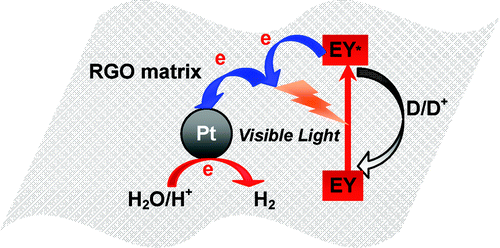Graphene, an atomic-layer thick two-dimensional (2D) carbon nanostructure, has attracted tremendous research interests owing to its outstanding electronic, optical, thermal, and mechanical properties and theoretically high surface area of ~2600m2g-1 and therefore showed a variety of applications in nanoelectronics, sensors, batteries, supercapacitors, and catalysis.
Researchers at the State Key Laboratory for Oxo Synthesis and Selective Oxidation of the Lanzhou Institute of Chemical Physics of the Chinese Academy of Sciences have successfully applied reduced graphene oxide (RGO) in dye-sensitized visible-light-driven hydrogen evolution from water by making use of the excellent electronic properties of RGO.
In this hydrogen evolution system, a Eosin Y is used as a photosensitizer, RGO sheets work as an electron relay mediator for efficiently accepting and transporting electrons, and Pt nanoparticles works as catalyst, which were dispersed on the surface of RGO sheets. The apparent quantum yield (AQY) of 9.3% for hydrogen evolution has been achieved at 520 nm. The effects of parameters such as pH value, the concentration of Eosin Y, and the Pt loading amount on the activity of hydrogen evolution were investigated. The RGO is found to transfer electron efficiently from photosensitizer Eosin Y to Pt catalyst and retard the recombination of photoexcited pairs, resulting in an enhancement in photocatalytic activity.
The present work demonstrates the feasibility of using RGO as an efficient electron relay mediator between other efficient photosensitizers and catalyst, which also holds tremendous potential for practical applications.
The work has received support from the National Program on Key Basic Research Project of China (973 Program), National High-tech R&D Program of China (863 Program) and the Solar Energy Project of the Chinese Academy of Sciences.
The findings have been published in J. Phys. Chem. C (J. Phys. Chem. C 2011, 115, 13938-13945).
J. Phys. Chem. C Paper


